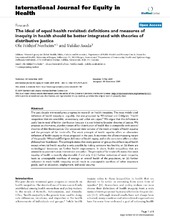| dc.contributor.author | Norheim, Ole Frithjof | en_US |
| dc.contributor.author | Asada, Yukiko | en_US |
| dc.date.accessioned | 2013-10-01T14:51:34Z | |
| dc.date.available | 2013-10-01T14:51:34Z | |
| dc.date.issued | 2009-11-18 | eng |
| dc.Published | International Journal for Equity in Health 8(1):40 | eng |
| dc.identifier.issn | 1475-9276 | |
| dc.identifier.uri | https://hdl.handle.net/1956/7339 | |
| dc.description.abstract | The past decade witnessed great progress in research on health inequities. The most widely cited definition of health inequity is, arguably, the one proposed by Whitehead and Dahlgren: "Health inequalities that are avoidable, unnecessary, and unfair are unjust." We argue that this definition is useful but in need of further clarification because it is not linked to broader theories of justice. We propose an alternative, pluralist notion of fair distribution of health that is compatible with several theories of distributive justice. Our proposed view consists of the weak principle of health equality and the principle of fair trade-offs. The weak principle of health equality offers an alternative definition of health equity to those proposed in the past. It maintains the all-encompassing nature of the popular Whitehead/Dahlgren definition of health equity, and at the same time offers a richer philosophical foundation. This principle states that every person or group should have equal health except when: (a) health equality is only possible by making someone less healthy, or (b) there are technological limitations on further health improvement. In short, health inequalities that are amenable to positive human intervention are unfair. The principle of fair trade-offs states that weak equality of health is morally objectionable if and only if: (c) further reduction of weak inequality leads to unacceptable sacrifices of average or overall health of the population, or (d) further reduction in weak health inequality would result in unacceptable sacrifices of other important goods, such as education, employment, and social security. | en_US |
| dc.language.iso | eng | eng |
| dc.publisher | BioMed Central | eng |
| dc.rights | Attribution CC BY | eng |
| dc.rights.uri | http://creativecommons.org/licenses/by/2.0/ | eng |
| dc.title | The ideal of equal health revisited: definitions and measures of inequity in health should be better integrated with theories of distributive justice | en_US |
| dc.type | Peer reviewed | |
| dc.type | Journal article | |
| dc.date.updated | 2013-08-28T16:39:35Z | |
| dc.description.version | publishedVersion | en_US |
| dc.rights.holder | Ole Norheim et al.; licensee BioMed Central Ltd. | |
| dc.rights.holder | Copyright 2009 Norheim and Asada; licensee BioMed Central Ltd. | |
| dc.identifier.doi | https://doi.org/10.1186/1475-9276-8-40 | |
| dc.identifier.cristin | 343101 | |
| dc.source.journal | International Journal for Equity in Health | |
| dc.source.40 | 8 | |
| dc.source.14 | 1 | |
| dc.source.pagenumber | 40- | |

